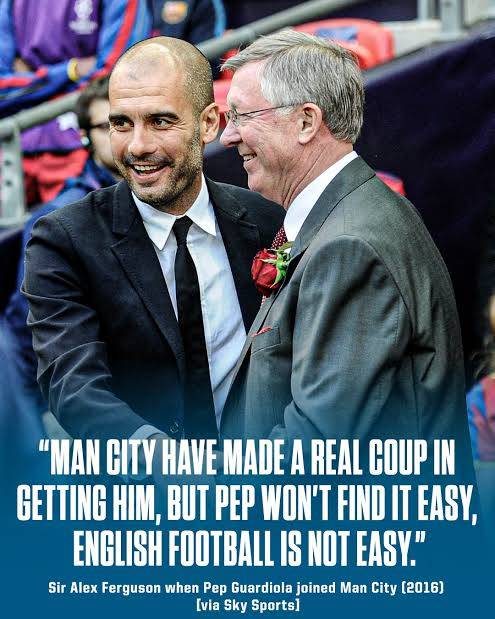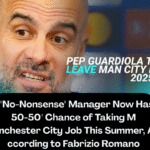Sir Alex Ferguson’s Prophetic Words: The Guardiola Prediction That Shaped Manchester City’s Destiny

When Pep Guardiola arrived at Manchester City in the summer of 2016, the football world watched with anticipation and skepticism in equal measure. The Catalan maestro had conquered Europe with Barcelona and dominated German football with Bayern Munich, but the Premier League represented an entirely different beast. Among those observing from the sidelines was Sir Alex Ferguson, the legendary former Manchester United manager, whose prescient words about Guardiola’s appointment would prove both insightful and controversial.
The Arrival of a Tactical Revolutionary
Guardiola’s appointment at Manchester City was met with enormous fanfare. The club had been searching for a manager who could elevate them from successful contenders to true footballing royalty, and in Guardiola, they believed they had found their man. His reputation preceded him like few others in the modern game. At Barcelona, he had orchestrated perhaps the greatest team in football history, with a side that featured Lionel Messi, Xavi, Andrés Iniesta, and a host of other world-class talents playing a brand of football that was as beautiful as it was effective.
His subsequent stint at Bayern Munich had been similarly impressive, though perhaps less transformative. The Bavarian giants were already a powerhouse when he arrived, and while he maintained their domestic dominance, the elusive Champions League trophy remained frustratingly out of reach during his three-year tenure. This pattern of domestic success coupled with European disappointment would later become a recurring theme in discussions about Guardiola’s managerial prowess.
When City announced his signing, the football establishment knew they were witnessing a seismic shift in English football’s landscape. Here was a manager whose very presence could attract the world’s best players and whose tactical innovations had influenced an entire generation of coaches. Yet, for all the excitement surrounding his arrival, there were those who harbored doubts about whether his methods would translate to the unique demands of English football.
Ferguson’s Measured Assessment
Sir Alex Ferguson, having retired from management in 2013 after an unprecedented 26-year reign at Manchester United, remained one of the most respected voices in football. His achievements spoke for themselves: 13 Premier League titles, five FA Cups, four League Cups, and two Champions League trophies. More importantly, he had overseen an era of sustained excellence that spanned different generations of players and tactical evolutions in the game.
When Ferguson spoke about Guardiola’s appointment in a revealing interview with Sky Sports, his words carried the weight of someone who had not only succeeded at the highest level but had done so while adapting to the ever-changing demands of football management. Ferguson’s assessment was characteristically balanced, acknowledging Guardiola’s undeniable qualities while highlighting the unique challenges that awaited him in England.
“Guardiola has a fantastic work ethic,” Ferguson observed, recognizing one of the Catalan’s most defining characteristics. Those who had worked with Guardiola at both Barcelona and Bayern Munich consistently spoke of his obsessive attention to detail, his relentless pursuit of perfection, and his ability to extract the maximum potential from his players. Ferguson understood that these qualities were non-negotiable for success at the highest level, regardless of the league or country.
However, Ferguson’s praise came with a caveat that would prove prophetic. He believed that Guardiola’s demanding nature would serve him well at Manchester City, particularly in weeding out players who lacked the commitment and professionalism required to succeed under his system. “Anyone who doesn’t work hard at Manchester City will not last long under Guardiola’s management,” Ferguson predicted, and subsequent events would prove him absolutely correct.
The Premier League Challenge
Ferguson’s most intriguing observation concerned the unique challenges of managing in the Premier League. Drawing from his extensive experience and his observations of other foreign coaches who had tried to make their mark in English football, Ferguson suggested that Guardiola would find success but might struggle to replicate the extraordinary heights he had reached at Barcelona.
This assessment was rooted in Ferguson’s understanding of what made English football different. The Premier League’s relentless pace, with its packed fixture schedule and minimal winter break, tested managers and players in ways that other leagues did not. The physical demands were intense, the tactical approaches varied wildly from team to team, and the margin for error was often razor-thin.
Ferguson had witnessed firsthand how even the most accomplished foreign managers had needed time to adapt to these unique pressures. Arsène Wenger, despite his eventual success at Arsenal, had endured difficult periods and had spoken openly about the adjustment required when moving to English football. José Mourinho, for all his tactical acumen and psychological warfare, had experienced both triumphant highs and devastating lows during his various stints in the Premier League.
The Scottish legend’s prediction that Guardiola would “struggle to replicate his success at Barcelona in England” was not born from any lack of respect for the Catalan’s abilities. Rather, it reflected a deep understanding of the contextual factors that had made Barcelona’s success so extraordinary and the recognition that those conditions would be impossible to recreate at Manchester City.
The Barcelona Legacy: A Standard Almost Impossible to Match
To understand Ferguson’s prediction fully, it is essential to appreciate the magnitude of what Guardiola achieved at Barcelona between 2008 and 2012. His Barcelona side was not merely successful; it was revolutionary. They played a style of football that was both aesthetically pleasing and devastatingly effective, combining technical brilliance with tactical sophistication in a way that had rarely been seen before.
The team’s foundation was built around players who had grown up together in La Masia, Barcelona’s famous youth academy. Xavi, Iniesta, Messi, Sergio Busquets, and Gerard Piqué had all learned to play football the Barcelona way from an early age, creating an almost telepathic understanding on the pitch. This homegrown core was supplemented by carefully selected additions like Dani Alves, David Villa, and others who perfectly complemented the existing system.
During Guardiola’s four-year tenure, Barcelona won 14 major trophies, including three La Liga titles and two Champions League crowns. More significantly, they did so while playing a brand of football that captivated audiences worldwide. Their possession-based approach, built around short passing, constant movement, and pressing from the front, became known as “tiki-taka” and influenced tactical thinking across the globe.
The statistical measures of Guardiola’s Barcelona success were staggering. In 247 matches across all competitions, his team averaged 2.36 points per game (using a three-point system for all matches to enable comparison). This level of consistency and excellence set a benchmark that would prove difficult for Guardiola himself to match in his subsequent appointments.
The Manchester City Project: A Different Challenge
When Guardiola arrived at Manchester City, he inherited a club with ambitious owners, substantial financial resources, and a squad containing several world-class players. However, the situation was fundamentally different from what he had encountered at Barcelona. City lacked the deep-rooted footballing philosophy and homegrown player development that had been crucial to Barcelona’s success.
The Premier League presented its own unique challenges. Unlike La Liga, where Barcelona and Real Madrid often dominated possession and territory against smaller opponents, the English top flight was more competitive from top to bottom. Teams like Leicester City could win the title, as they had done in the season before Guardiola’s arrival, and supposedly lesser sides regularly took points from the established giants.
Guardiola’s first season at City was a learning experience for both manager and players. The team struggled with his tactical demands, finishing fourth in the Premier League and failing to win a single trophy. Critics questioned whether his methods would work in English football, and there were moments when Ferguson’s prediction seemed prescient.
However, Guardiola’s response to these early challenges demonstrated the adaptability and resilience that had made him successful throughout his career. He spent heavily in the transfer market, bringing in players who better suited his system, and gradually molded the squad into his tactical vision.
The Transformation and Sustained Success
What followed was a period of dominance that even Ferguson might not have anticipated. From the 2017-18 season onwards, Manchester City became the benchmark for excellence in English football. They won the Premier League with a record 100 points in Guardiola’s second season, a feat that demonstrated not just tactical superiority but also the kind of relentless consistency that had characterized Ferguson’s own Manchester United teams.
Over the course of his tenure at City, which has now extended to over 516 matches and nearly nine years, Guardiola has won six Premier League titles, surpassing even his domestic trophy count at Barcelona. The team has also claimed multiple domestic cups and, crucially, the Champions League in 2023, ending years of European frustration for both manager and club.
From a statistical perspective, Guardiola’s Manchester City career presents an interesting comparison to his previous appointments. While his points-per-game average of 2.28 at City is slightly lower than his averages at Barcelona (2.36) and Bayern Munich (2.41), the longevity of his success in Manchester has been remarkable. The fact that he has remained competitive at the highest level for nearly nine years in one of the world’s most demanding leagues is a testament to his evolutionary approach to management.
Ferguson’s Prediction in Context
Evaluating Ferguson’s original prediction requires nuance and context. In one sense, the Scottish legend was correct: Guardiola has not quite replicated the pure statistical dominance he achieved at Barcelona. The Barcelona team of 2008-2012 remains unique in football history, and the circumstances that enabled their success – the homegrown core, the perfect tactical fit, the relatively weaker domestic competition – have not been replicated at City.
However, in another sense, Ferguson may have underestimated Guardiola’s capacity for adaptation and evolution. While the raw statistical measures might favor his Barcelona tenure, the argument could be made that his achievements at Manchester City are actually more impressive when considered in context. He has succeeded in a more competitive league, with players he largely inherited or recruited rather than developed from youth level, and has maintained excellence over a much longer period.
The current season has provided an interesting test of both Guardiola’s resilience and the validity of Ferguson’s long-term predictions. With City sitting in fifth place after 28 games, having won 14, drawn five, and lost nine matches for a total of 47 points, the team is experiencing its most challenging period under Guardiola’s management. This struggle has reignited debates about whether the Catalan’s methods remain as effective as they once were and whether the intense demands of Premier League football are finally taking their toll.
The Broader Impact on English Football
Regardless of how one evaluates Ferguson’s specific prediction about replicating Barcelona’s success, there is no disputing Guardiola’s transformative impact on English football. His arrival at Manchester City coincided with a broader tactical evolution in the Premier League, with other managers adopting elements of his possession-based approach and high pressing game.
The influence extends beyond tactics to areas such as player recruitment, training methods, and even stadium design. City’s investment in their training facilities and youth academy has been guided by Guardiola’s philosophy, creating infrastructure that will benefit the club long after his eventual departure.
Moreover, Guardiola’s success has raised the bar for what constitutes excellence in English football. His teams’ ability to combine domestic dominance with European success has set new standards that other clubs and managers must strive to match.
The Question of Legacy
As Guardiola navigates what appears to be his most challenging period at Manchester City, questions about his legacy inevitably arise. Ferguson’s original prediction provides an interesting framework for evaluation. If success is measured purely by whether Guardiola has exceeded his Barcelona achievements, then Ferguson’s skepticism appears justified. The Barcelona team remains the pinnacle of Guardiola’s career in terms of pure footballing artistry and statistical dominance.
However, if success is measured by sustained excellence, adaptability, and transformative impact, then Guardiola’s Manchester City tenure must be considered a remarkable achievement. He has proven that his methods can succeed in different contexts and has evolved his approach to meet new challenges while maintaining his core philosophical principles.
The current difficulties facing Manchester City serve as a reminder that even the most successful managers are not immune to periods of struggle. Ferguson himself experienced challenging seasons during his long tenure at Manchester United, and his ability to overcome these setbacks was often what separated him from his contemporaries.
Conclusion: The Enduring Relevance of Ferguson’s Words
Sir Alex Ferguson’s prediction about Pep Guardiola’s appointment at Manchester City was the product of a footballing mind that understood both the demands of management at the highest level and the unique challenges of succeeding in English football. While his specific prediction about replicating Barcelona’s success remains a matter of debate, his broader observations about Guardiola’s character and the challenges he would face have proven remarkably prescient.
Guardiola’s Manchester City career has been defined by sustained excellence, tactical innovation, and the ability to adapt to new challenges while maintaining his core principles. Whether his achievements in Manchester surpass those at Barcelona is ultimately a matter of perspective, but there can be no doubt that he has left an indelible mark on English football.
As City navigates their current struggles, Ferguson’s words serve as a reminder that success in football is cyclical and that even the greatest managers must constantly evolve to remain at the pinnacle of the game. Guardiola’s response to this latest challenge will likely determine not only his immediate future at Manchester City but also how his entire Premier League legacy is ultimately remembered.
The dialogue between Ferguson’s prediction and Guardiola’s actual achievements continues to evolve, providing rich material for football analysts and historians. What remains constant is the recognition that both men represent the very highest standards of football management, each having shaped the game in their own distinctive and lasting ways.















